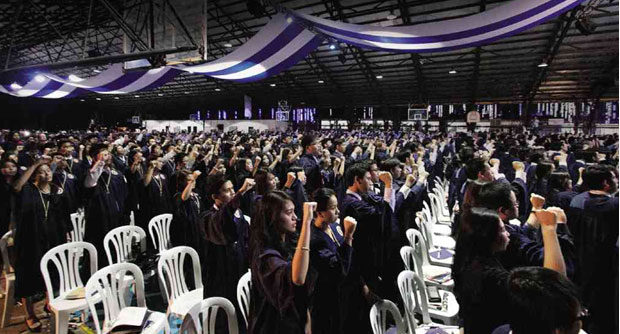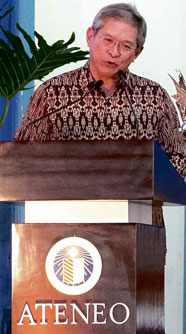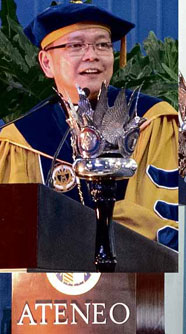‘We have no Planet B’
With what words would you send off the graduates of Ateneo de Manila University Loyola Schools? If you were Jose Ma. Lorenzo Tan, an alumnus (AB Psychology, 1974) who is now CEO and vice chairman of the World Wildlife Fund (WWF), would warn them a little, lift their spirits a little and let them surf the blues a little with words that send out an SOS: For them to continue to enjoy food, air and water, they had better take care of the planet because there is no Planet B.
Tan had reportedly met with some members of the graduating class upon being invited to speak at the combined commencement ceremonies of the School of Humanities and the John G. Gokongwei School of Management. He had wanted to get a feel of what to speak about. Despite the world having “changed so profoundly,” he said he found it curious that the Class of 2014 asked the same questions he and his classmates had 40 years ago.
“The windmills we were jousting [with] then now seem almost trivial compared to the challenges your generation must overcome,” said Tan.
Many of those challenges are ecological in nature. People do not just consume natural resources at an alarming amount, said Tan. They also generate waste at a rate that overshoots the planet’s capacity to absorb the waste and replenish the resources necessary for life to thrive.
“The world is well into an ecological deficit,” he warned. “We are living beyond our means. In our heart of hearts, all of us know that eventually, all these debts must be paid … Beyond economics and the bothersome games of geopolitics, there are biological realities that we have ignored for too long. Nature is our inventory.”
Already sitting on a frying pan, the world will tip into the fire with the large migrations from the countryside to the cities, he said.
“Remember Tacloban? That experience highlights another systemic shift your generation faces,” Tan told his audience, who are now Bachelor of Arts, Bachelor of Fine Arts and Bachelor of Science in Management degree holders. “Make no mistake, there will be more ‘Yolandas.’ There will also be more Taclobans. A climate-defined future will be highly variable.”
Tan exhorted the graduates “to transform catastrophe into renaissance” with the help of their millennial tools, such as crowdsourcing, open-source technologies and collective intelligence.
“It all starts with a selfie. But it cannot end there,” he said. “Many of you are blessed with intelligence, creativity, resources and networks. Use these gifts to turn things around. Work together. The limits of individual reach become infinite when tapped into the productive fusion borne of collective opportunity.”
Tan lamented that the response to the need for environmental protection had been small and shortsighted. “You are going to have to be much more ambitious, more thoughtful and, certainly, more careful. We have no Planet B.”
For those who cannot see how melting ice can affect a tropical country like the Philippines, Tan said 80 percent of global trade was still maritime.
He asked: “If we do not retrofit our seaports, how will we avoid economic dislocation? What happens to the bananas and pineapples that are shipped out of Davao and Cagayan de Oro? What happens to the industrial complexes in Batangas? Can Cebu retain its hold on processing and trade? How do we keep Metro Manila viable?”
Had he remained a book publisher, Tan would have most likely focused his commencement address on literacy and culture instead of the environment. But as it happened, after managing Bookmark for 17 years, he shifted his attention to nature conservation. Not quite abruptly, though. Always an outdoorsman, he had taken an interest in wildlife photography while still in publishing. He complemented his camera outputs with writing and eventually produced books that promoted ecotourism. He came out with “A Field Guide to Whales and Dolphins of the Philippines” in 1995 and followed it with “The Last Great Forest: Luzon’s Northern Sierra Madre Natural Park.”
Almost 40 years ago, he took up diving, knowing full well that “humans breathe air” and “the oceans are a hostile environment.” He told his young listeners that every time he dove into the Tubbataha Reefs, he was aware “that anything could be down there, behind me, waiting.” From his underwater exposure, he learned “what to expect, what to do and what to avoid at all costs.” In a matter of time, he would get involved in WWF.
At the third commencement held at Ateneo de Manila University in the last week of March, Tan addressed the questions posed by the students he had met with, foremost of which was: Is there hope for the Philippines?
“Of course there is,” said Tan. “All over the world, many Filipinos do well. Exceedingly well. We have all seen how warmly our country has embraced and internalized the tools of this Age of Information. This is a gift and it comes with a responsibility. These tools have opened up the doors to the Age of Citizenship. Governance is not government. It is you and I. Democracy is not merely freedom. It is participation. There have been thieves and charlatans in our midst who have made our lives more difficult than they should be. But that can change and I am confident that if more Filipinos commit to give our best for our country, rather than create new burdens, a change is going to come.”
Be proud to be Filipino, he told the graduates. “Over the last five centuries, we have become masters of assimilation and improvisation. Like coral reefs, we thrive on confluence. Like sponges, we soak it in, masters of ‘cut and paste.’ That is no longer enough.”
Tan ended his speech, which was streamed live, with a poignant plea: “Whatever you do to this world of ours, always remember that she is not yours. She is only being lent to you. One day, you will have to give her back. Like everything you borrow, it is your responsibility to make sure that you return her in better shape than when she was first lent to you. She is in your hands now. Please, please take care of her.”
After his turn at the lectern, Tan received from university president Fr. Jose Ramon Villarin, SJ, a replica of the Sacred Heart statuette carved out of baticulin wood by Dr. Jose Rizal when he was a young student at Ateneo.

















